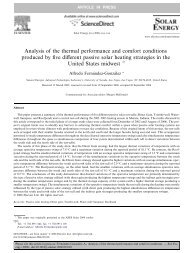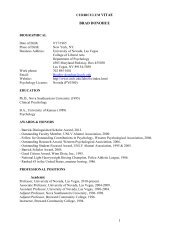2013 Conference Proceedings - University of Nevada, Las Vegas
2013 Conference Proceedings - University of Nevada, Las Vegas
2013 Conference Proceedings - University of Nevada, Las Vegas
- No tags were found...
You also want an ePaper? Increase the reach of your titles
YUMPU automatically turns print PDFs into web optimized ePapers that Google loves.
classroom. She has successfully incorporated technology into her lessons. She has focusedon student thinking and arranges her instruction based on the needs <strong>of</strong> her students. Herlessons are becoming more student centered, encouraging her students to solve novelproblems and share their solutions. Through this project, she has become a more reflectiveteacher, striving to improve her teaching through action research and collaboration withcolleagues.ReferencesBall, D. L., Thames, M. H., Phelps, G. (2008). Content knowledge for teaching: What makes itspecial? Journal <strong>of</strong> Teacher Education, 59, 5, 389-407.Bandura, A. (1977). Self-efficacy: Toward a unifying theory <strong>of</strong> behavioral change.Psychological Review, 84, 191-215Buczyniski, S., & Hansen, C. B. (2010). Impact <strong>of</strong> pr<strong>of</strong>essional development on teacherpractice: Uncovering connections. Teacher and Teaching Education, 26, 599-60Cantrell, Cambers, S., & Hughes H. K. ( 2008). Teacher efficacy and content literacyimplementation: An exploration <strong>of</strong> the effects <strong>of</strong> extended pr<strong>of</strong>essional development withcoaching. Journal <strong>of</strong> Literacy Research, 40, 95-127Curcio, F. R. (2002). A User’s Guide to Japanese Lesson Study: Ideas for ImprovingMathematics Teaching. National Council Of Teachers <strong>of</strong> Mathematics Inc., Reston, VA.Desimone, L. M., (2009). Improving impact studies <strong>of</strong> teachers’ pr<strong>of</strong>essional development:Toward better conceptualizations and measures. Educational Researcher, 38, 3, 181-199.Hill, H. C., Ball, D L., & Schilling, S. G. (2008). Unpacking pedagogical content knowledge:conceptualizing and measuring teachers’ topic-specific knowledge <strong>of</strong> students. Journal forResearch in Mathematics Education, 39, 4, 372-400.Hunzicker, J. (2012). Effective pr<strong>of</strong>essional development teachers: a checklist. Pr<strong>of</strong>essionalDevelopment in Education. Routledge, London W1T 3JH, UK.Llewellyn, D., & Van Zee E. (2010). Action research: Expanding the role <strong>of</strong> classroomteachers to inquirers and researchers. Science Scope. September 1, 2010.MacIsaac, D. L., Sawada, D., & Falconer, K. A. (2001). Using the reform teacher observationprotocol (RTOP) as a catalyst for self-reflective change in secondary science teaching. InDeveloping and utilizing an observation instrument to define, quantify, assess and refinereformed teaching practice in K–20 science and mathematics. Peer-reviewed poster andpaper. American Education Research Association Division K.National Council <strong>of</strong> Teachers <strong>of</strong> Mathematics. Principles and Standards for SchoolMathematics. Reston, VA: NCTM, 2000.Shulman, L. S., (1986). Those who understand: Knowledge growth in teaching. EducationalResearcher, 15, 2, 4-14.Tschannen-Moran, M., Woolfolk Hoy, A., & Hoy, W. K. (1998). Teacher efficacy: Its meaningand measure. Review <strong>of</strong> Educational Research, 68, 202-248.Woolfolk-Hoy, A. (2008). Changes in teacher efficacy during the early years <strong>of</strong> teaching. Paperpresented at annual meeting <strong>of</strong> the American Educations Research Association. NewOrleans, LA.<strong>Proceedings</strong> <strong>of</strong> the 40 th Annual Meeting <strong>of</strong> the Research Council on Mathematics Learning <strong>2013</strong> 115




